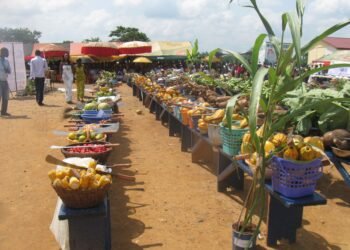The Ghana Rice Inter-Professional Bodies is urging the government to capitalize on the recent surge in local rice production and consumption to help stabilize the Ghanaian economy.
According to the organization, by reducing the reliance on imported rice, which costs the country over $400 million annually, Ghana could save substantial foreign exchange, bolster local production, and positively impact local economies.
Ghana’s import bill exceeds $10 billion annually, covering a wide range of items including agricultural products like rice, fish, poultry, and palm oil. Other major imports include iron, steel, aluminum, sugar, oil, cement, fertilizer, pharmaceuticals, toilet rolls, toothpicks, and fruit juices. This heavy dependence on imports exerts tremendous pressure on the cedi, contributing to an unfavorable balance of payments.
Nana Kwabena Adjei Ayeh II, President of the Ghana Rice Inter-Professional Bodies and Divisional Chief of Ningo-Gangan under the Apimanim Traditional Area in the Central Region, emphasized that policy and financial interventions are crucial to reversing the trend of importing products like rice, sugar, and fish, which can be produced locally. He highlighted the potential of local rice production to alleviate the economic burden caused by imports and strengthen the cedi.
“The government must create market linkages for the large quantities of rice being produced this year to avoid post-harvest losses and increase the income levels of smallholder farmers,” Nana Ayeh urged. By doing so, the country can not only save on import costs but also enhance local agricultural productivity and ensure food security.
Nana Ayeh also called on Ghanaians to change their mindsets and patronize locally produced rice, which he claimed is more nutritious, healthier, and tastier than imported varieties. Local rice offers unique health benefits, such as providing carbohydrates for energy, manganese for metabolism and bone formation, and folate for healthy red blood cell production.
Challenges Faced by Local Farmers
Meanwhile, rice farmers from various districts, including Assin South, Assin Central, Assin North, and Twifo Atti-Morkwa, corroborated the concerns raised by the Association. They reported difficulties in accessing markets and obtaining fair prices for their produce. Samuel Kofi Baidoo, a farmer from Assin Abodweseso, shared his struggles with selling his rice at giveaway prices due to a lack of market access last year.
Farmers also face challenges like post-harvest losses due to bushfires and insufficient storage facilities, compounded by rising costs of inputs and farm implements. These issues have forced some farmers to reduce their production capacity or avoid large-scale farming altogether. “The situation forced some farmers to produce below capacity. Others did not engage in large-scale farming as they did in previous years,” Baidoo noted.
Madam Matilda Amoasi, a farmer from Assin Akropong, echoed these sentiments, highlighting the high cost of production and the need for immediate government intervention. “I do think that ‘Planting for Food and Jobs’ is doing well, but we must look strategically at some crops in which we achieve self-sufficiency; it will help the economy,” she said. She stressed that reducing imports of rice, palm oil, vegetable oil, and chicken would help stabilize the cedi and improve the overall economic situation.
To maximize the potential of local rice production, the government needs to implement strategic interventions, including better market access, storage solutions, and financial support for farmers. Strengthening the local rice industry can significantly reduce the import bill, support smallholder farmers, and stabilize the cedi.
READ ALSO: Bank Blue Chip Rescues GSE At Last Breath























